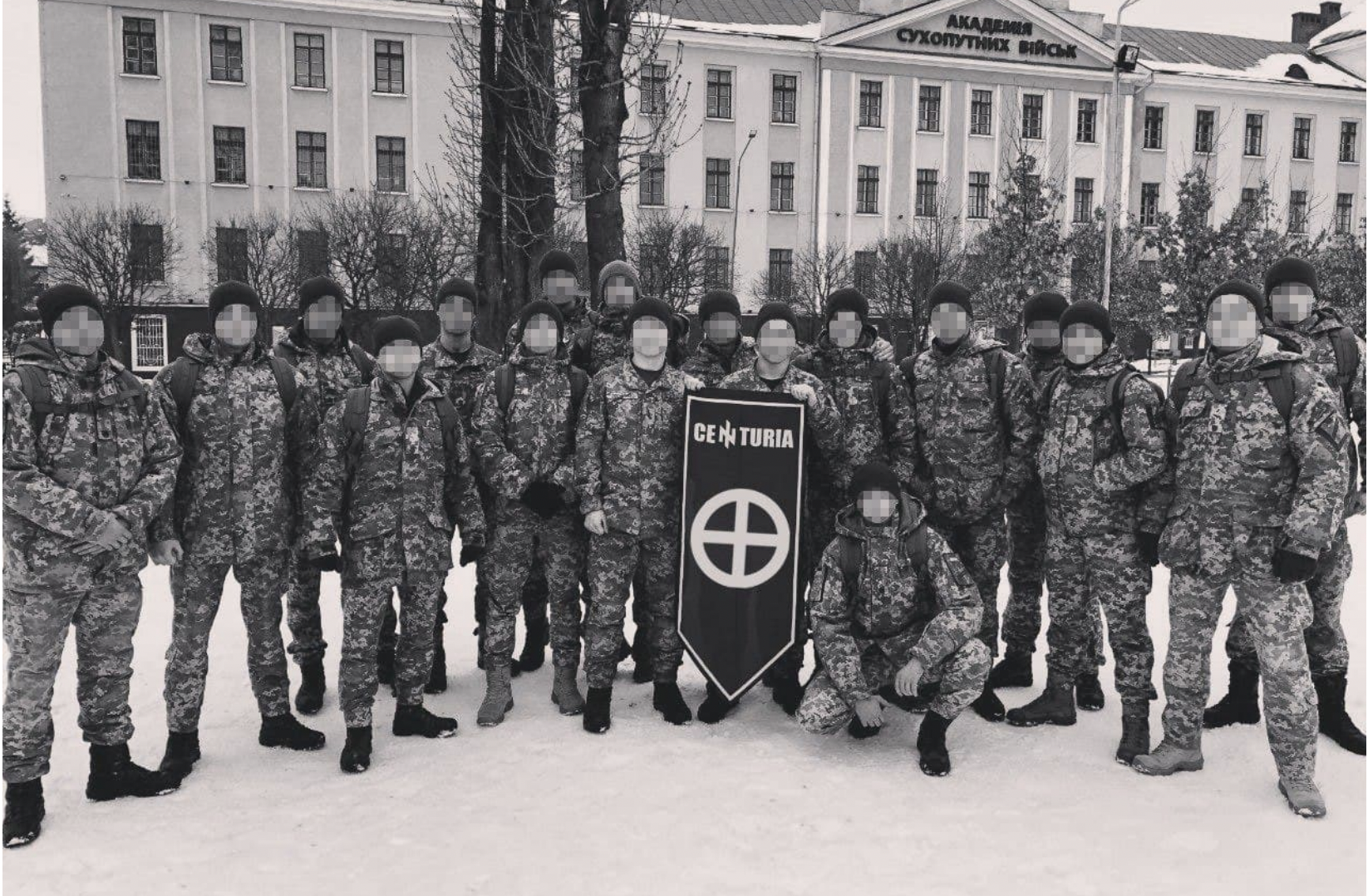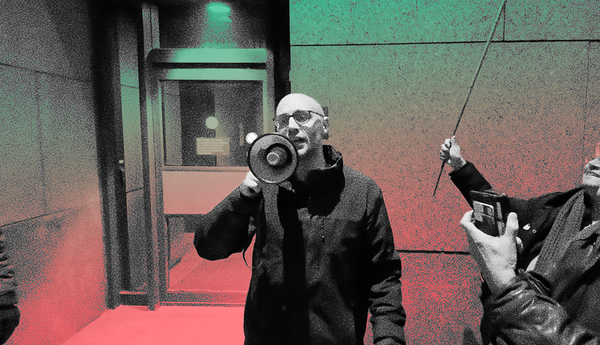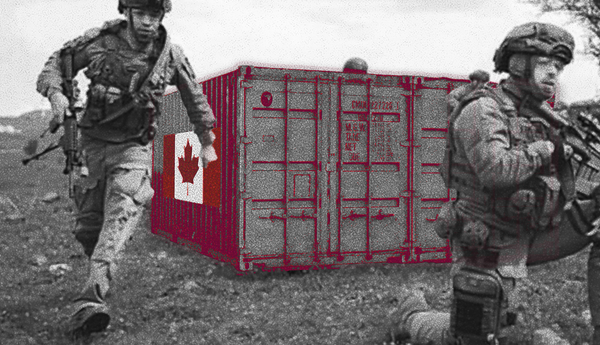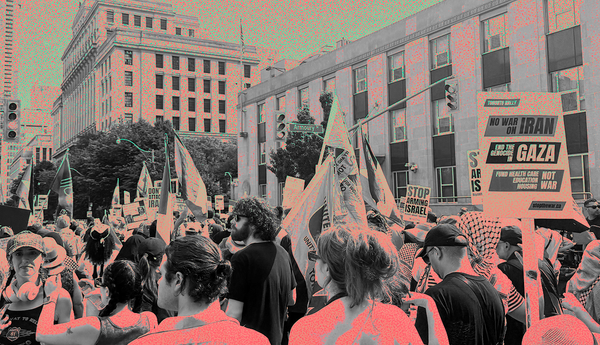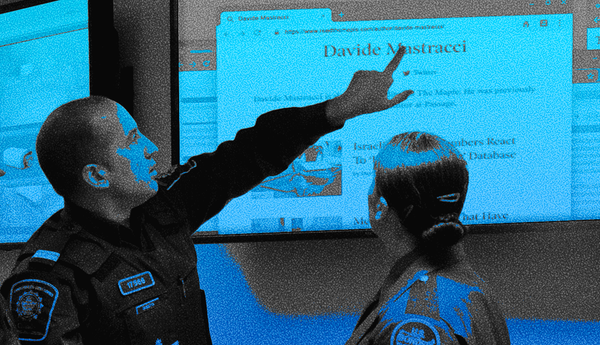The Canadian military is claiming — without specific evidence or examples — that a report linking Ukrainian far-right extremists to a NATO training program contained Facebook photos that were “doctored” to support “Russian disinformation."
The report’s author, who published the study out of George Washington University (GWU) last year, told The Maple he is prepared to explore legal options to defend his work against unsubstantiated claims made by any national government.
The Canadian Armed Forces (CAF) made the suggestion – which had not previously been made public – after being contacted by The Maple earlier this month regarding documents obtained through an access to information (ATI) request. The documents showed that CAF officials admitted in the fall of 2021 that they believed the report was credible and represented a “continuous issue” — not a concoction of Russian propaganda.
Despite the unsubstantiated suggestion about the report, CAF admitted in an unsigned email to The Maple that it does not know which photos were allegedly altered and could not present specific evidence to back up the claim, instead deferring to Ukraine’s Ministry of Defence.
The report, published out of GWU in September 2021, revealed that Ukrainian military cadets affiliated with the neo-Nazi “Centuria” group had boasted online about receiving training from the Canadian military and other NATO forces at the Hetman Petro Sahaidachny National Army Academy.
The report did not only rely on photos to present its case, but also extensively cited videos, text on social media channels, Ukrainian media reports, and other online publications and documents. While CAF referred specifically to “Facebook” photos, many of the images in the report were obtained from Telegram and Instagram.
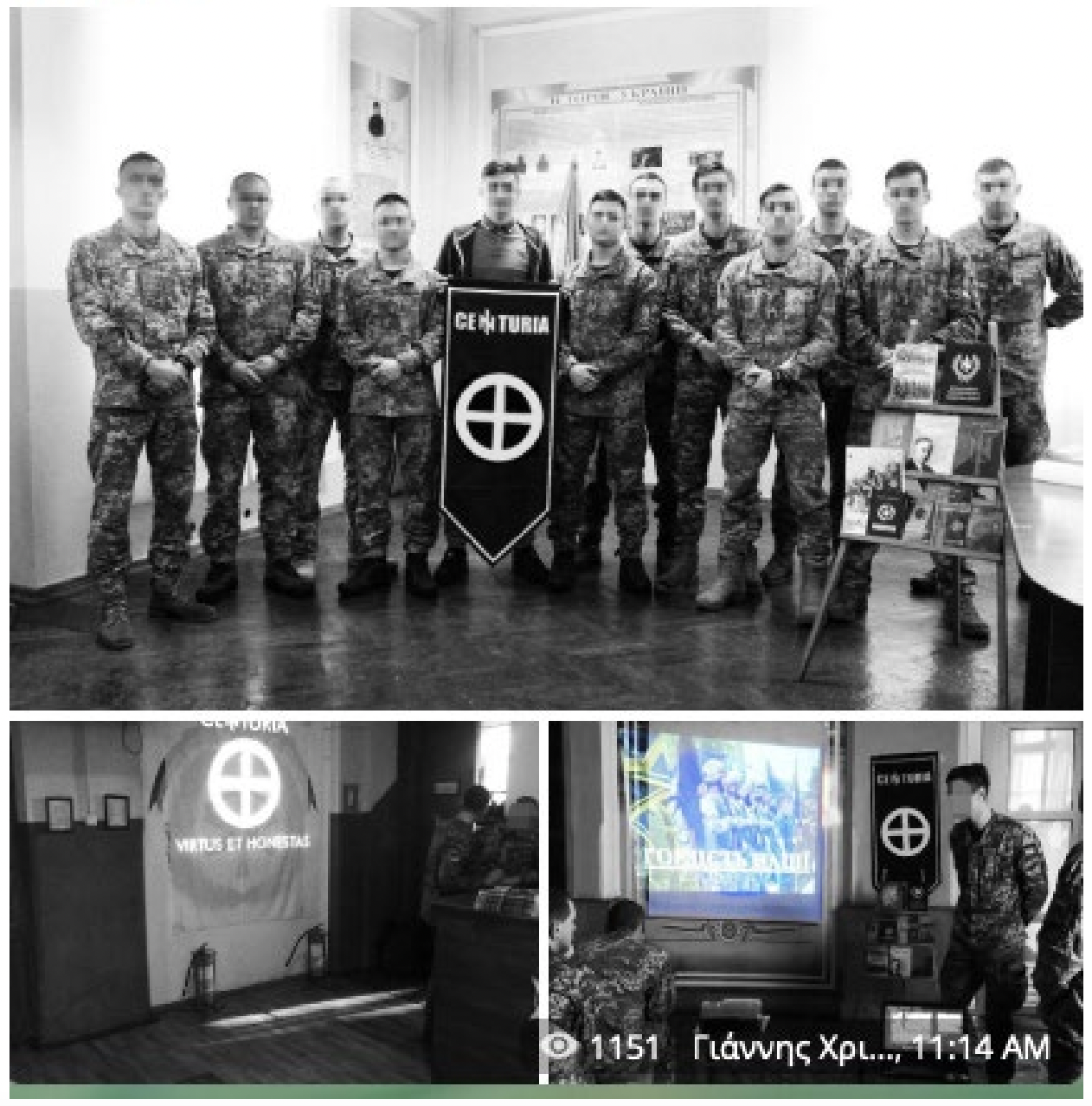
CAF would not say if they believed the allegedly doctored photos discredited the report as a whole when asked directly by The Maple.
Furthermore, the report itself noted that Centuria had likely altered some of the photos cited in the study to blur faces and alter certain symbols — but these changes did not detract from the report’s findings.
Documents obtained by The Maple show that at the time of the report’s publication, Canadian officials spoke behind the scenes of a need for a robust information “posture” to avoid allowing the report and others like it to be used to discredit Operation UNIFIER, Canada’s $890 million military training program in Ukraine.
In an unsigned statement sent to The Maple via email earlier this month, CAF said “The Ministry of Defence of Ukraine determined that many of the photos selected [in the GWU report] had been manipulated/doctored to discredit the operation,” but also noted: “Canada takes the issues raised by the GWU report very seriously” and said it proactively “enhanced the training [CAF] provides to members on extremism prior to deployments.”
It added, “The suggestion by the Ministry of Defence of Ukraine that the photos on Facebook were doctored to support a Russian disinformation campaign was noted.”
After multiple requests for clarification, CAF admitted in another unsigned statement that it did not know which photos were allegedly doctored to support “Russian disinformation.” In response to additional questions seeking further information, CAF deferred to Ukraine’s Ministry of Defence.
Ukraine’s Ministry of Defence, which is currently grappling with Russia’s illegal invasion and occupation of Ukraine, did not respond to a request for details from The Maple.
A representative from GWU and the report’s author, Oleksiy Kuzmenko, told The Maple they had not been contacted by either CAF or Ukraine’s Ministry of Defence for any reason since the report was published, and were not aware of any such claim until The Maple brought it to their attention. Both find allegations of a supposed Russian disinformation campaign shocking and said the fact that they were made without presenting any evidence is revealing.
Without any details or specifics provided by CAF or Ukraine — including about who they believe made the alterations — Kuzmenko said it was impossible to comment on what he described as a vague and unsubstantiated allegation. The photos in the report, he added, were obtained from Centuria-run social media accounts and from sites, social media accounts operated by entities mentioned in the report, and were not the only pieces of evidence presented in the report that demonstrated the group’s activities at the academy.
Kuzmenko – who has previously received death threats because of his work – said he is concerned about the possibility of physical attacks by individuals misled or encouraged by “irresponsible” claims by the governments of Canada and Ukraine. He said he welcomes any evidence supporting the allegation, and is ready to explore legal options to defend his work against any unsubstantiated claims from national governments.
As noted above, the report pointed to examples where Centuria itself edited photos that it posted to social media. In all these cases, the images contained neo-Nazi symbolism before and after the suspected digital alterations were made.
For example, the report noted that Centuria used banners containing symbols “reminiscent of crosshairs” in lieu of the neo-Nazi Sonnenkreuz symbol at the academy. The report explained this might have been because the former symbol was deemed safer to use inside the institution. However, Centuria members may have in some cases later manipulated images of those banners to include the Sonnenkreuz symbol before posting the images on their social media accounts.
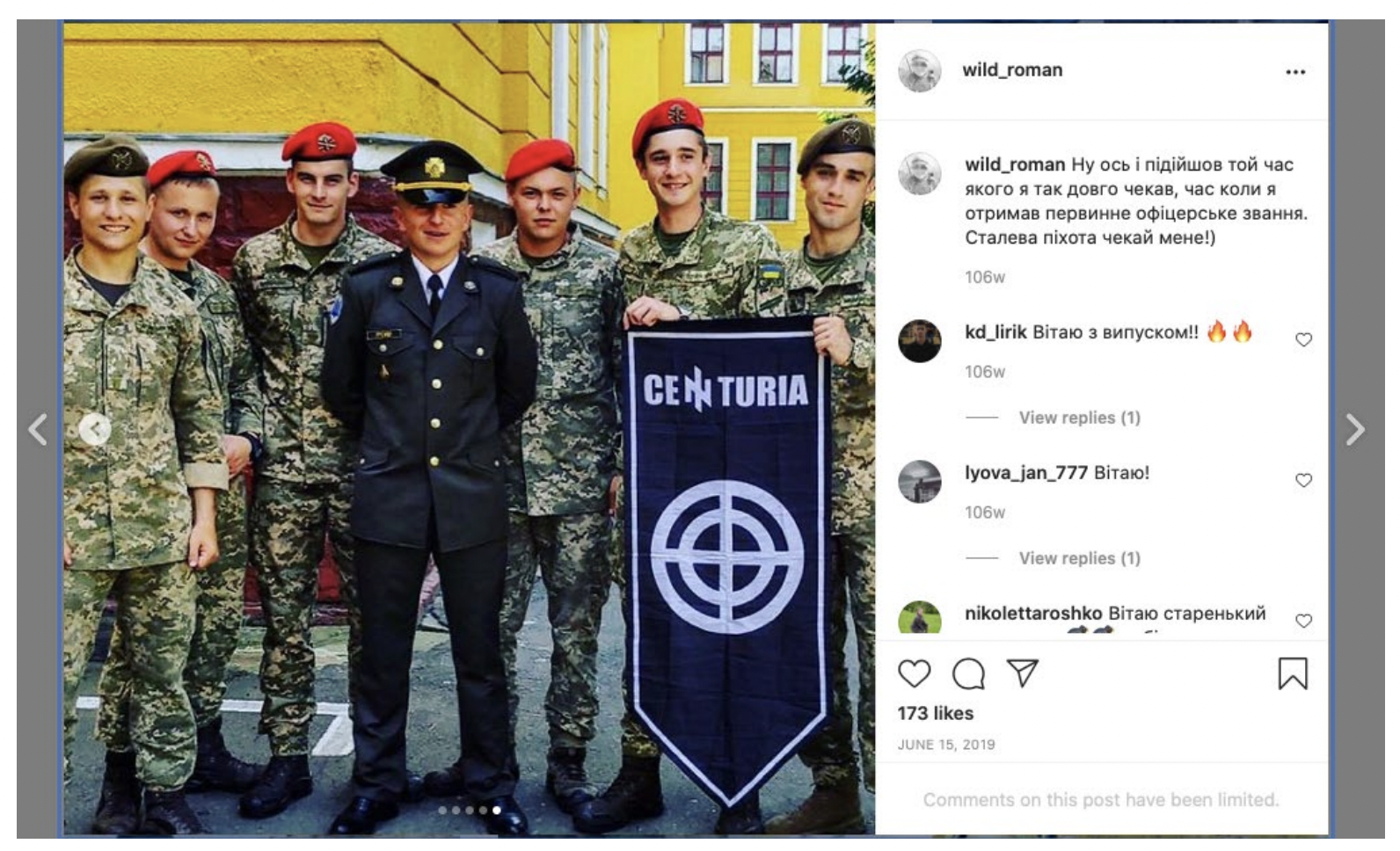
As well, both the edited and unedited images of those banners contained the neo-Nazi Wolfsangel symbol, which is also widely used by the neo-Nazi Azov Regiment.
CAF admitted it could not say if these were the allegedly “doctored” photos referred to in their statement to The Maple.
As part of Operation UNIFIER, CAF personnel assisted with training at the academy, but withdrew from Ukraine shortly before Russian President Vladimir Putin launched his illegal invasion and occupation of that country in late February. The GWU report was published five months before the invasion began.
The study also cited photos of Centuria members giving Nazi salutes, promoting extremist views online and praising members of Nazi SS units. The group is linked to Ukraine’s far-right Azov movement, and some members likely went on to serve in the Ukrainian armed forces. The group’s objective, explained in a 2020 Telegram post, is to “attain the highest ranks inside the Armed Forces [of Ukraine] in order to become an authoritative core able to hold significant influence within the structure of the Armed Forces.”
The report prompted an internal review by Canada’s Department of National Defence (DND) last fall. In May this year, DND told CTV News in a statement: “The review examined whether the CAF had exercised their due diligence in preventing members of right-wing extremist organizations from receiving training as part of Operation UNIFIER.”
“The report is still under review by the CAF chain of command, but it concludes that there was no factual basis found of neo-Nazi links for the group trained by Task-Force Ukraine.”
That conclusion, which was accompanied with no details or specific examples, came a few months after CAF officials internally admitted in correspondence newly obtained by The Maple through an ATI request that they believed the report was credible.
Officials Previously Said Report Was Not a ‘Russian Info Operation’
The Maple first filed the ATI request over a year ago, and the documents were only released following a complaint to the Office of the Information Commissioner (OIC). The Department of National Defence (DND) further delayed the release of the documents for more than a week after the OIC advised The Maple that the documents should have been delivered.
In a Sept. 22, 2021 email, Colonel Robert Foster, a member of the Canadian military attaché in Ukraine, drew attention to the GWU report, commenting that “We may see this gain interest in media so should be prepared for queries.”
He claimed that the Ukrainian Ministry of Defence’s reported assertion that it does not screen new cadets for extremist views was “incorrect or taken out of context,” but admitted that the vetting process “may not be as extensive as one would think.”
“I will follow-up with my colleagues,” he added.
Foster did not express concern about the report’s findings or recommend specific actions be taken beyond preparing for media enquiries.
In response to the report’s publication, CAF staff told their superiors that they had prepared officials for media requests and were running a “social media listening process to see if this story has any pick up.”
On Sept. 29, 2021, Foster relayed to other CAF officials that Ukraine’s Ministry of Defence had “appointed an official inspection of information disseminated in the media.” In its statement earlier this month, CAF told The Maple it had not received any written reports from Ukraine about the issues raised in the GWU report since the start of the invasion.
After the GWU report was covered in an article by David Pugliese at the Ottawa Citizen in early October 2021, Lieutenant-Colonel Shane Myatt warned other CAF officials that similar reports could emerge and that they might be used to criticize Operation UNIFIER.
In a largely redacted email, Myatt wrote: “We can expect more stuff like this, and possibly additional efforts to discredit the operation.”
“We may need a more proactive information posture that sensitizes key decision-makers to these, and future, claims,” he added.
In a reply, Foster admitted: “The author of the article [Pugliese] is pretty credible and we can’t deny the linkage of students to the Uk and DEU training.”
“We will need to make sure that the issues are not blown out or [sic] context.”
Sande Ewart, Canada’s directorate of NATO policy, concurred, writing: “George Washington University is a well-respected academic institution. This isn’t some blog or Face Book page and it’s not a Russian info ops campaign.”
“This is a continuous issue,” he added. “We should be forward leaning, rather than reactive.”
The story about the GWU report was also covered by CTV News later that month.
None of the officials in the internal correspondence obtained by The Maple expressed concern about the GWU report’s revelations, or suggested that the military academy’s vetting process ought to change.
In a statement to The Maple, CAF denied that comments in the ATI documents reflected an attempt to deflect criticism away from UNIFIER.
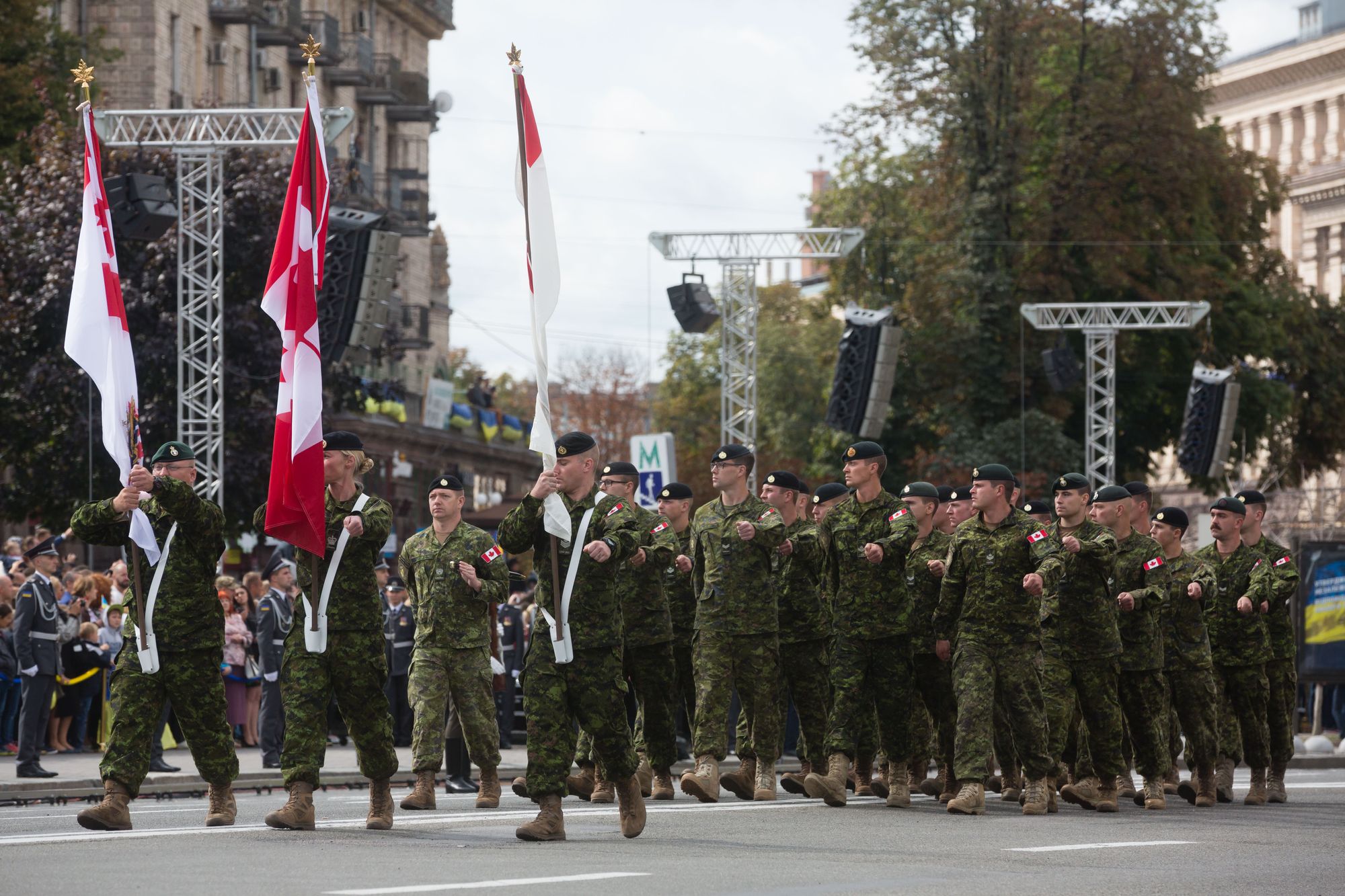
“Ukraine is a contested information environment, in which competitors use information and misinformation as tools to shape decisions and actions,” the statement said.
“It is in this context that a more proactive information posture to inform key decision makers was suggested, given the importance to make decision makers aware of possible attempts by competing nations to shape judgements.”
Since the start of Putin’s invasion, UNIFIER’s operations were moved to the United Kingdom.
“All personnel receiving instruction as part of UNIFIER-UK are vetted by the Ukrainian government,” CAF said. “Canadian personnel receive training on visual identification of fringe political beliefs. CAF members will remain vigilant for any sign of extremism on the part of the recruits.”
An Ongoing Issue
Last year, CAF was revealed to be eager to deflect media attention away from similar reports about its engagement with another far-right group in an article published by Pugliese in November 2021.
Pugliese found that Canadian officers who were reported to have met with and been briefed by members of the neo-Nazi Azov Regiment – an officially incorporated unit in Ukraine’s National Guard – in 2018 did not denounce the group, but instead feared that journalists would expose the meeting.
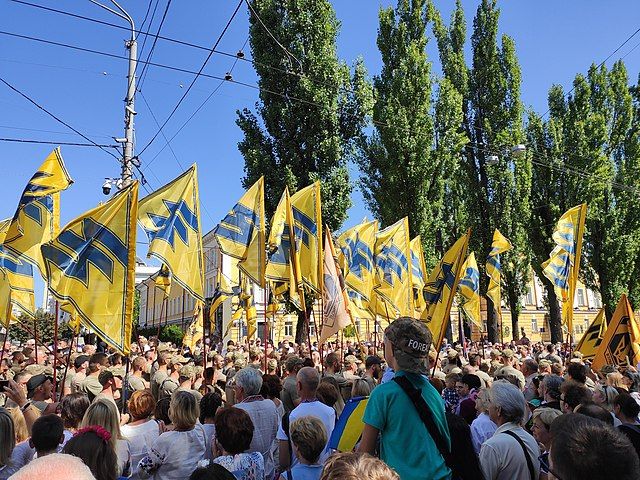
The officers allowed themselves to be photographed with members of the regiment, who subsequently used the images for propaganda purposes. At the time, Bernie Farber of the Canadian Anti-Hate Network said: “This a horrendous mistake that shouldn’t have been made.”
The revelations about the meeting and the findings in the GWU report prompted a military review, but it was reported that parts of the study would remain secret.
In April this year, Radio Canada and CTV News provided further evidence showing that the CAF had trained members of Ukraine’s military who were reported to be members of far-right groups.
Efraim Zuroff of the Simon Wiesenthal Center in Israel told the Ottawa Citizen in April: “The Canadian government didn’t do its due diligence. It’s the responsibility of the Canadian defence ministry to know exactly who they are training.”
“There is no question that there are neo-Nazis in different forms in Ukraine, whether they are in the Azov regiment or other organizations,” he added.
These findings do not appear to have impacted decisions regarding Canada’s arms transfers to Ukraine. In March this year, DND officials told The Maple that "the Canadian Armed Forces have never - nor will it ever - provide training or support the Azov Battalion or affiliated entities.”
However, in September, DND would no longer rule out the possibility that Canadian weapon transfers to Ukraine have ended up in Azov Regiment’s hands when asked again by The Maple.
Chief of Defence Staff Wrote to Jewish Group
Although officials did not express concerns about the GWU report’s findings in the internal correspondence obtained by The Maple, they did so in communications with external groups.
The Maple obtained a copy of a letter sent by Canada’s Chief of Defence Staff General Wayne Eyre to the Friends of Simon Wiesenthal Centre (FSWC) soon after the publication of the GWU report.
FSWC had called for a DND investigation after the report’s publication. “It is unacceptable for our armed forces to be emboldening neo-Nazi groups in Ukraine, or any other country, through the provision of CAF training,” the group stated on Oct. 18, 2021.
“This is an issue fundamental to the purpose of Canada’s forces and to the respect we owe our veterans – who sacrificed so much to defeat fascism in Europe.”
In his letter, Eyre wrote that training far-right groups is “contrary to our values and ethics as an institution.”
“My staff are currently reviewing the matter with our training team in Ukraine, and also with representatives of the Ministry of Defence in Ukraine.” Eyre added that the CAF “is strongly opposed to the glorification of Nazism and all forms of racism, racial discrimination, xenophobia, intolerance and extremism.”
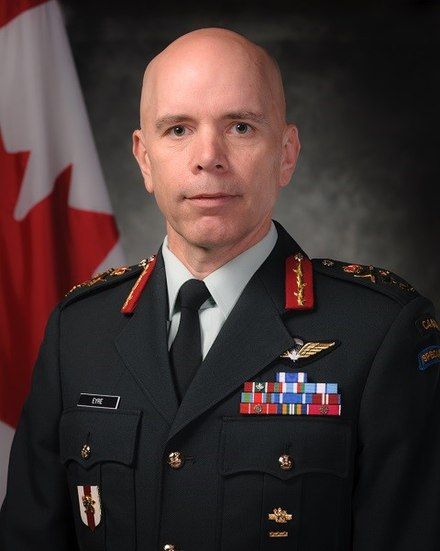
He said that if anyone in the CAF’s training sessions is suspected of holding such views, Canadian soldiers are instructed to permanently remove them from such activities. “This viewpoint is not negotiable,” Eyre wrote.
Changing Narratives About Ukrainian Far-Right
The issue of far-right extremism in Ukraine became a particularly contentious issue following the launch of Russia’s invasion in late February, as Putin sought to justify the illegal attack by claiming that Ukraine needed to be “de-nazified.”
As revealed in a joint investigation by Passage and The Maple in August, major news outlets in Canada readily acknowledged Azov’s neo-Nazi ideology during the first months of the invasion without giving credence to the Kremlin’s false narrative about Ukraine being a Nazi state.
However, that changed in May this year when Azov soldiers played a central role in fighting Russian forces at the Azovstal steel plant. At that time, major news publications began downplaying or omitting any mention of the group’s far-right ideology.
According to Ivan Katchanovski – a political science professor at the University of Ottawa specializing in Russia, Ukraine and armed conflicts – claims about Azov’s de-radicalization are inaccurate, and the changing narrative was likely motivated by political concerns rather than facts.
Alex Cosh is the managing editor of The Maple.


